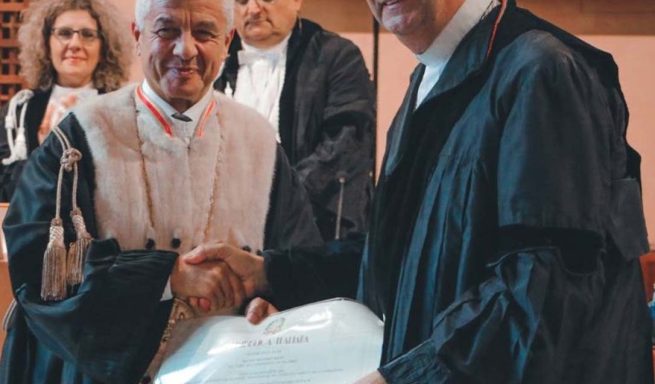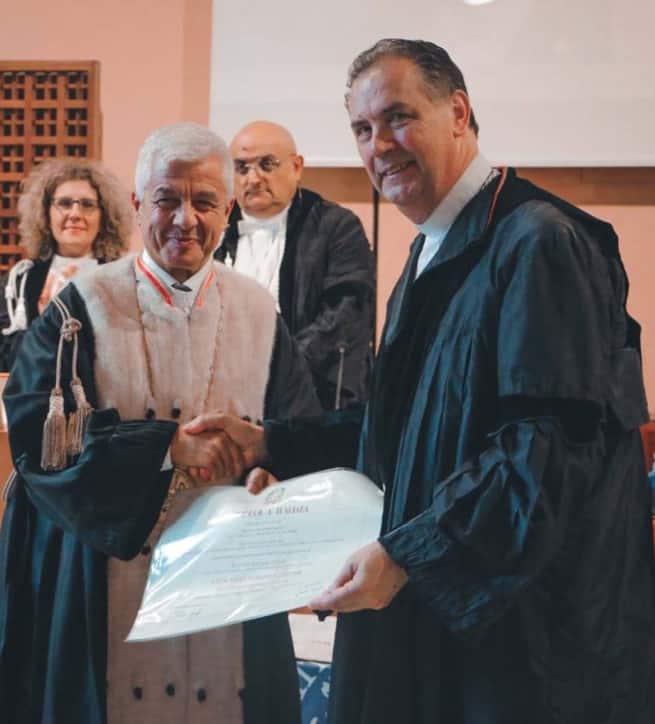(ANS – Palermo) – “Salesian pedagogy today is in itself, and wants to be everywhere, a pedagogy that prepares and enriches for life.” This was affirmed by Fr. Ángel Fernández Artime, Rector Major of the Salesians, in his lectio magistralis entitled “La pedagogia salesiana tra attualità e futuro, Salesian pedagogy – present and future” elaborated on the occasion of the conferment of the degree honoris causa in Pedagogical Sciences received from the University of Palermo last Thursday, Oct. 13.
Fr. Á.F. Artime, thus honored for the commitment of the Salesians and his staff in the field of education and the integral development of the person, emphasized that
“Many young people have encountered an image of God that has distanced them from the true God of joy, of the good life. This has often happened through a series of prohibitions and rules that show God with the face of a stern judge. This has not allowed a profound and meaningful encounter with Jesus”.
“A better starting point,” indicated the Rector Major, “is the presentation of a joyful and sympathetic life experience on the human, affective, relational level. Then propose, starting from the educational and pastoral point of view, “adequate itineraries of knowledge and discussion” with the “reasons of our faith.” “Don Bosco respected the starting situation, also from the point of view of faith, and proposed personalized itineraries of growth. The case of Michele Magone and Domenico Savio is exemplary. The point of arrival was the same, but the path was each one’s own.”
Hence, the invitation to “accompany along the way” to “foster that fire of the heart that is born in the balanced relationship between faith, life, reason, and meaning of life.” And the path indicated is to “seek together with young people a path aimed at making definitive choices.”
On the topic of education and today’s challenges, the Rector Major then notes, “Virtual reality, which has enormous potential as a tool, ends up inducing a kind of dopaminergic apathy that results in young people’s inability to discern, to live a full life, to contemplate reality, beauty or to meet others.”
“To educate, to offer personal life ideas, life projects for the future, a strong identity, are important tasks and very present and current today, as they were in Don Bosco’s time,” he observes.
“The Salesian Preventive System, based on reasonableness, religion, and loving-kindness, has not lost its relevance, because, adapted to new times, it still has an excellent and unparalleled pedagogical essence that will enable the educator to face the challenges of today’s world”.
The reference is to “young people who are increasingly present in the digital and online world, far from the dimension of encounter, of sharing, of a meaningful life.”
But despite this context, “the treasure of Don Bosco’s experience and charism is offered with the same reliability for the educational success of young people today,” the 10th Successor of Don Bosco reiterates.
He adds: “The digital dimension of young people’s lives represents an educational challenge more than in the past because it affects the lives of young people: it is their world, the space where their life flows and takes place, the place where it becomes evident how virtual reality is increasingly absorbing young digital natives.”
Moreover, “The digital dimension of young people’s lives represents an educational challenge more than in the past, because it affects young people’s lives: it is their world, the space where their lives flow and are fulfilled, the place where it becomes evident how virtual reality is increasingly absorbing young digital natives.”
It is, on closer inspection, “a new areopagus, courtyard, sphere of life where young people need to be accompanied in order not to fall into the traps and dangers (loneliness, manipulation, exploitation, violence, cyberbullying, pornography) that increasingly inhibit them by preventing them from recognizing the boundary between real and virtual, and causing them to fall, not infrequently, into extreme loneliness and that inability to establish real and true relationships with others.”
The full text of the Lectio Magistralis is available here.
Source Agencia SIR


